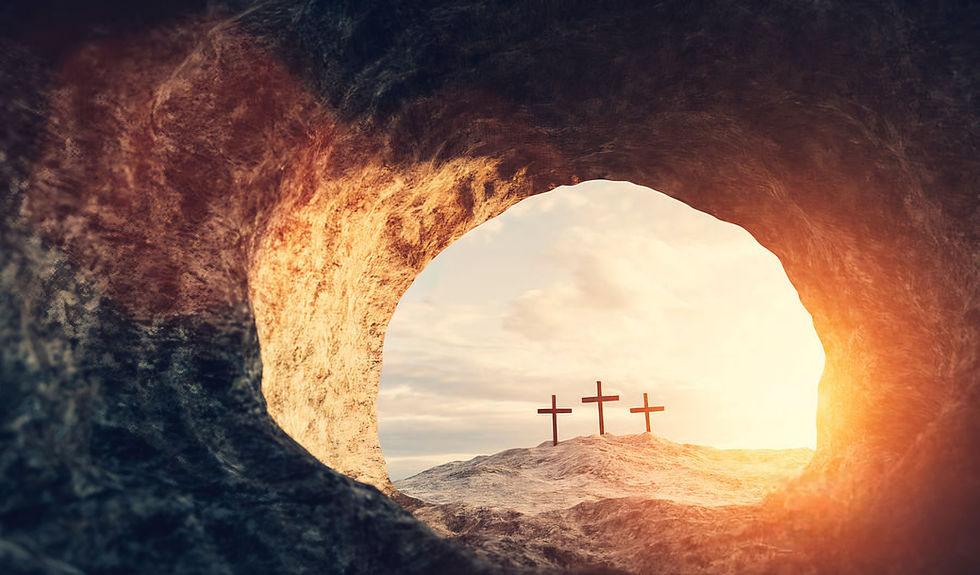The Blueprint for the Christ Follower: Follow Carefully
- Crossfire

- Jun 3, 2024
- 4 min read

Over the past few weeks, I’ve been working to get our home ready to sell. When it was time to paint the basement, I spent more time than I would like to admit on Google and Pinterest looking for the right color. I wanted help choosing a color with the right undertones based on the amount of natural light. After looking at a lot of pictures for inspiration and learning far more than I needed to know about paint, I ultimately went with a color I liked on a paint card at Sherwin Williams.
It's always good to understand our options before making a decision. In Matthew 7:13, Jesus had just finished teaching his disciples the guiding principles for a Christ follower before giving them a command, “Enter by the narrow gate.” He was always calling on his disciples to make a decision, just like He's always calling us to make a decision. He paints a vivid picture of the 2 options - the narrow gate or the wide gate.
The wide gate is easy to enter. It's so spacious that a lot of people go that way. It appears attractive and becomes crowded, but it ultimately ends in destruction. The narrow gate is difficult but leads to life, and there are few who find it. Jesus warns us of a path that leads to destruction and in verse 15, He warns us that there are many who would try to guide us along the wide path.
“Beware of false prophets, who come to you in sheep’s clothing, but inwardly they are ravenous wolves. You will know them by their fruits. Do men gather grapes from thornbushes or figs from thistles? Even so, every good tree bears good fruit, but a bad tree bears bad fruit. A good tree cannot bear bad fruit, nor can a bad tree bear good fruit. Every tree that does not bear good fruit is cut down and thrown into the fire. Therefore by their fruits you will know them.”
Wolves are known for being ferocious and the most common natural enemy of sheep. They are always looking for a sheep that has strayed away from the flock. Even a grown, healthy sheep is defenseless against a wolf. False prophets, like wolves, are clever and vicious.
False prophets were not new to Israel. Moses warned ancient Israel:
If a prophet or a dreamer of dreams arises among you and gives you a sign or a wonder, and it comes true, concerning which he spoke to you, saying, “Let us go after other gods (whom you have not known) and let us serve them,” you shall not listen to the words of that prophet or that dreamer of dreams; for the Lord your God is testing you to find out if you love the Lord your God with all your heart and with all your soul. You shall follow the Lord your God and fear Him; and you shall keep His commandments, listen to His voice, serve Him, and cling to Him. But that prophet or that dreamer of dreams shall be put to death, because he has counseled rebellion against the Lord your God.” (Deuteronomy 13:1–5)
In the Old Testament, God told the prophet Jeremiah:
“The prophets are prophesying falsehood in My name. I have neither sent them nor commanded them nor spoken to them; they are prophesying to you a false vision, divination, futility and the deception of their own minds.” (Jeremiah 14:14)
Paul warned the Roman believers: “Now I urge you, brethren, keep your eye on those who cause dissensions and hindrances contrary to the teaching which you learned, and turn away from them. For such men are slaves, not of our Lord Christ but of their own appetites; and by their smooth and flattering speech they deceive the hearts of the unsuspecting." (Romans 16:17–18).
In the New Testament, false prophets are called false brothers (2 Corinthians 11:26); false apostles (2 Corinthians 11:13); false teachers (2 Peter 2:1); false speakers, or liars, (1 Timothy 4:2); and false Christs (Matthew 24:24). The apostle John tells us, therefore, “Beloved, do not believe every spirit, but test the spirits to see whether they are from God, because many false prophets have gone out into the world” (1 John 4:1).
Paul’s last words to the Ephesian elders included a somber warning about inevitable false teachers. “I know that after my departure savage wolves will come in among you, not sparing the flock; and from among your own selves men will arise, speaking perverse things, to draw away the disciples after them. Therefore be on the alert” (Acts 20:29–31). Paul's words could have been written to the churches in American today.
Those warnings are summarized in the word translated beware in Matthew 7:15. It is not a call simply to notice or sense something, but to be on guard against it because it is so harmful. False prophets are more than wrong; they are dangerous and they pervert thinking.
Jesus goes on to say that we will know false prophets by their fruits. The condition of the fruit will reveal the character of the tree. He's given us the Bible and tools to discern, but so often today we go to Google, social media, Bible commentaries, or podcasts for answers to questions that may determine which gate we choose. We can choose a paint color, a new brand of makeup or outfit based on an influencer’s recommendation, but in an age of chaos and confusion when our options are destruction or life, the only place to find the truth is the Word of God.
The gate is narrow because there is only one way in to Heaven, Jesus. Jesus Himself says in John 14:6, “I am the way, the truth, and the life. No one comes to the Father except through me.” He is not a way, as in one of many; He is the way, as in the one and only. No one, regardless of reputation, achievement, knowledge, or personal holiness, can come to God the Father except through Jesus.
We must follow carefully, desire to know the Lord and delight in His law. A deep intimate desire to know the Lord, to keep our noses in the Word, and to be a woman grounded firmly in the truth. As Peter would say, to grow in the grace and knowledge of our Lord Jesus Christ. (2 Peter 3:18)



Comments